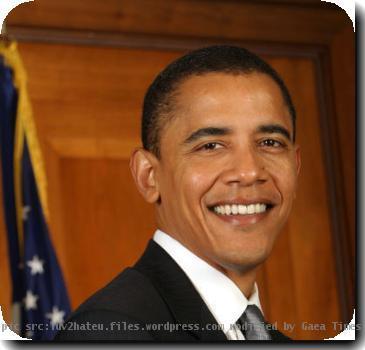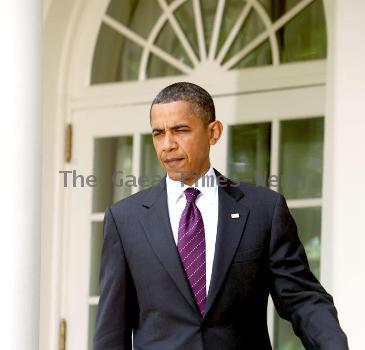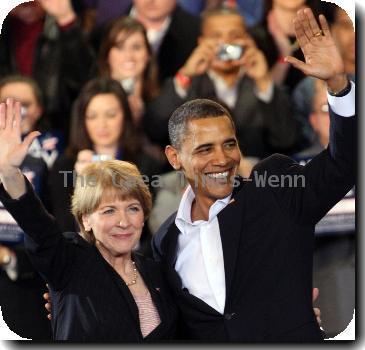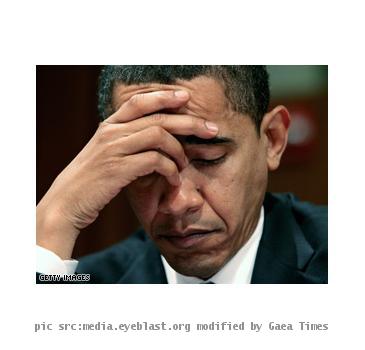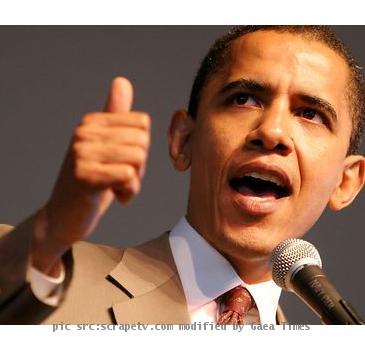Obama says voters may blame him in elections, urges Congress to extend middle-class tax cuts
By Tom Raum, APFriday, September 10, 2010
Obama: Voter anger could hurt Dems in elections
WASHINGTON — Facing big Democratic losses in November, President Barack Obama blamed Republicans and election-year politics Friday for thwarting his efforts to do more to spur a listless national economy. He challenged Congress to quit squabbling and quickly approve “what we all agree on” — a reprieve for expiring tax cuts for the middle class.
“Let’s work on that. Let’s do it,” he told a nationally broadcast White House news conference, his first since last May.
Obama said his economic programs were helping, but “the hole the recession left was huge and progress has been painfully slow.”
Noting the stubbornly high jobless rate, Obama acknowledged that many voters in the Nov. 2 midterm elections probably will blame him for economic hard times and could take it out on congressional Democrats.
He said that “since I’m the president and Democrats have controlled the House and the Senate, it’s understandable that people are saying, you know, ‘What have you done?’”
Still, he said, “If the election is about the policies that are going to move us forward versus the policies that will get us back into a mess, then I think the Democrats will do very well.”
Polls suggest large-scale Republican victories and Democratic losses in the midterm races.
Obama pressed his case for Congress to renew most of the tax breaks enacted in 2001 and 2003 under President George W. Bush that are set to expire at the end of this year. But the president and Democratic congressional leaders want to end the cuts for the nation’s wealthiest — households earning over $250,000 a year, or over $200,000 for single filers.
Republicans want all the cuts extended, saying the economy is too fragile to be raising taxes for anyone, and some Democrats have suggested a compromise — extending all the cuts but just for a year or two.
Obama suggested he might be open to “further conversation” down the road with Republicans, but “my position is let’s get done what we all agree on” first — the tax cuts for everyone but the wealthiest.
“Why hold it up? Why hold the middle class hostage in order to do something that most economists don’t think makes sense,” he said.
House Minority Leader John Boehner, who probably would become House speaker if Republicans win control on Election Day, called Obama’s presentation full of “halfhearted proposals and full-throated political attacks” that wouldn’t end the uncertainty keeping many businesses from creating jobs.
Republicans have recently united around a proposal by Boehner to cut domestic spending to 2008 levels and freeze all tax rates for two years, an idea he suggested Obama has ignored. “This is a plan Congress can and should act on this month,” Boehner said.
Aside from the economy, Obama also used his 75-minute long East Room news conference to note that Saturday, the ninth anniversary of the Sept. 11 terror attacks, would be “a national day of service and remembrance.” He appealed to Americans to honor the nation’s long heritage of religious tolerance.
He said a plan by “the individual down in Florida” to mark the 9/11 anniversary by burning copies of the Quran could cause “profound damage” to U.S. troops and interests around the world. It was a reference to the Rev. Terry Jones, the pastor of a small, fundamentalist church in Gainesville, Fla.
After triggering outrage around the world, Jones said Thursday he would cancel the burning but later said he was reconsidering. Obama said he hoped the pastor “prays on it and refrains from doing it.”
Obama said the U.S. is still hunting for 9/11 attacks mastermind Osama bin Laden and al-Qaida’s No. 2, Ayman al-Zawahiri.
“Bin Laden has gone deep underground. Even Zawahiri, who is more often out there, has been much more cautious. But we have the best minds, the best intelligence officers, the best special forces, who are thinking about this day and night. And they will continue to think about it day and night as long as I’m president,” Obama said.
He defended the continued U.S. combat role in the long war in Afghanistan, saying it remains in the U.S. national interest.
At his first full-fledged meeting with reporters since May, Obama also:
— Said he was naming White House economist Austan Goolsbee to succeed Christina Romer as chairman of his Council of Economic Advisers.
— Said he is encouraging peace talks between Israel and the Palestinians because the alternative is a status quo that puts both parties and the U.S. at risk.
— Praised consumer advocate Elizabeth Warren, a Harvard professor and head of a panel investigating the financial meltdown, but said he’s not ready to make an announcement of whether she is his choice to head a new financial consumer protection bureau.
— Acknowledged his administration had fallen short in his goal of closing the Guantanamo Bay detention center after promising to do so within his first year as president. “We have missed that deadline. It’s not for lack of trying. It’s because the politics of it are difficult.”
— Conceded he hasn’t been able to create a greater spirit of cooperation in Washington but said that was partly because of the tough economic circumstances and partly because of the Republicans’ attitude, and he said, “I’m as frustrated as anybody by it.”
Obama said Republican obstructionism is hampering his ability to steer the nation into a stronger recovery. He renewed his insistence that Senate Republicans drop their stalling of a bill before the Senate to give small businesses new tax breaks and to help them get loans.
His previous economic revival effort, anchored by the $814 billion stimulus package passed soon after he took office, has been working, but “hasn’t done as much as we needed to do,” Obama said.
With public opinion sour on that first stimulus plan, Obama initially refused to call a new economic plan he laid out this week a “stimulus” plan but then said everything his administration was trying to do “is designed to stimulate growth and jobs in the entire economy.”
His new plan, rolled out over the past few days, would pump an additional $50 billion into road, rail and other infrastructure projects, make permanent an expired research and development tax credit and allow companies to take tax write-offs for 100 percent of what they spend on plants and equipment through 2011. Congressional action before Election Day seems unlikely
Obama said he understands why some Democratic congressional candidates are not saying much about his landmark health care overhaul, even many who supported it. The new law has proven unpopular.
“That’s how political races work,” he added.
Associated Press writers Liz Sidoti, Anne Gearan, Erica Werner, David Pace, Jim Kuhnhenn, Donna Cassata, Merrill Hartson and Mike Hammer contributed to this report.
Tags: 2010 United States General Election, Barack Obama, Events, General Elections, North America, Political Organizations, Political Parties, Recessions And Depressions, United States, United States General Election, Us-obama, Washington
